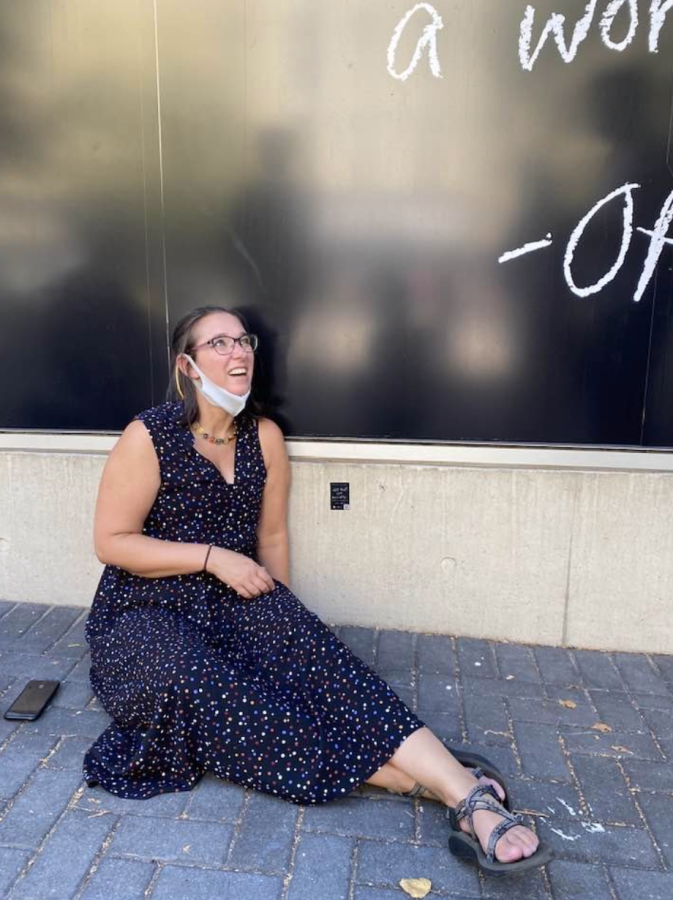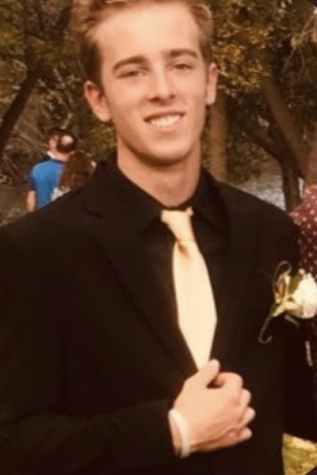TEACHER FEATURE: Professor Natalie Phillips conducts groundbreaking research under unique circumstances
Professor Natalie Phillips sitting on the ground at a disability art exhibition / Photo credit: Natalie Phillips
March 8, 2022
EAST LANSING – Michigan State English professor Natalie Phillips says that the students she teaches and works with are what motivate and ground her. While this is likely to be true, Phillips is the reason these students are able to shine in the ways that they do.
Phillips is the founder and co-director of the Digital Humanities and Literary Cognition Lab (DHLC) at Michigan State. The DHLC conducts groundbreaking research involving neuroscience and combines that with how brains respond to actions like reading literature, listening to classical music and more.
The first class that Phillips taught at Michigan State was a course on cognitive science and literature.
“I cross-listed it to all these different departments,” Philips said about that first course. “So we had all these students coming in who were in psychology, supply chain, education, English… so many different fields.”
At this time, Phillips was working on projects in the DHLC that explored an fMRI study of literary attention while reading Jane Austen. She had students read research articles in class and mentioned some of her personal work. This was the point where the DHLC began to take the form that it is today.
Half of the class came to Phillips after the course and asked if they could work with her. She said that this surprised her. She did not have enough office space to work with all of the students.
“I had a talk with the dean of the College of Arts and Letters and they were really supportive about creating an interdisciplinary lab,” Phillips said. “So it just sort of appeared out of this amazing commitment to digital humanities.”
The diversity of students who work in the lab really stands out. The first batch of students who volunteered to help were not an anomaly. The lab was founded in 2012 and 10 years later the diverse nature of backgrounds and majors hold true in the DHLC. Appropriately enough, the first lab lead was a triple major in English, neuroscience and chemical and molecular biology.
“You need to have all sorts of backgrounds coming together to design something that will really investigate complex cognitive questions and ask really sophisticated questions about the arts and reading and music,” she said.
Phillips describing her proudest moment during her time directing the DHLC speaks to her character and how she views her accomplishments. Instead of referring to one of her many personal accomplishments, she immediately described feeling fulfilled by the successes of her undergraduate lab leads.
The students working in the lab were studying how people experience beauty in art and what happens in the brain during this process. These students were able to travel with Phillips to present their work.
“The students were able to come with me and because of all the training in the lab, they were able to talk with these top researchers in the field from across the world and sit at the table and contribute these amazing insights about the experiments,” said Phillips. “That is obviously one of my proudest moments as a professor was getting to work with them and getting to see them just excel and shine.”
Growing up, Phillips lived in a variety of places; Ohio, Rhode Island, Virginia, Massachusetts, California and Michigan to name a few. She credits the constant moving to shaping who she is today.
“I think that really impacted my personality,” she said. “I don’t know if I would have been as outgoing as I am now because I just always needed to reach out and make friends and find people.”
Phillips attended Duke and Stanford and studied 18th century literature. She first became infatuated with studying English during a study abroad program at Oxford University.
She has been a professor in the English department of Michigan State for over 10 years. However, the last three have posed challenges that Phillips has never faced before. She was diagnosed with a neurological disorder that caused her to have muscle spasms at times that hindered her ability to teach in a normal classroom setting.
Phillips took an entire year off from teaching due to her medical condition. Some basic functions were made difficult or impossible to accomplish and she had to learn how to live with these new challenges.
“I actually had to re-learn how to walk while the world was spinning with vertigo,” Phillips said. “I was able to do that, it was amazing. I mean it was really difficult and very nauseating at times.
“But it is amazing that you can retrain the brain to learn how to walk and I now even can run when before I was relying on a walker and a cane.”
After the year off, Phillips was determined to return to teaching. The muscle spasms that she would have would force her to the floor at times. The issue could not be solved by just sitting down while teaching because sitting on most chairs would trigger these spasms as well.
“I thought ‘Well I’ve been able to teach in all sorts of situations, but if I am on the ground and my body is flailing how will there not be complete chaos?’” said Phillips. “My vision of what a professor was someone who was standing or at least sitting.”
The first class she taught after the year’s absence went much better for Phillips than she expected. She explained to the class that it was possible that she’d have to lay on the ground at some point as she had these spasms, but that she would be fine and can continue teaching. The first time it happened she remembered that the class took it in stride and this gave her confidence.
“That made me so much more confident in my general life just realizing that I can do this and realizing that I am fine and everyone else around me was fine with it,” she said.
In fact, not only was this not a hindrance to her classes and the learning experience, she became closer with students. She called the class “transformative” for her.
“It also opened up a whole new dynamic with students and I think people were more comfortable coming to me with challenges and questions.”
A student in the class asked when she was giving her ‘TED Talk’ after hearing Phillip’s story and the work she was doing in the lab. This vote of confidence from the student was a turning point for Phillips.
“I’ve really been working on accepting and even trying to celebrate the parts of my disability that make things different rather than just walk around and just embarrassedly explain to people that I have to sit on the ground,” Phillips said.
The research and the accomplishments from the DHLC are innovative, important and extremely unique. Phillips has created this space and deserves all the credit that she has gotten and will continue to get for the lab. However, the bond she creates with students and the impact that she has on their lives is just as important and meaningful as the research.































